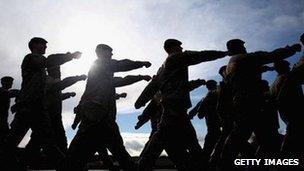Armed forces complaints procedure needs change, MPs say
- Published

Bullying is seen as acceptable by some in the Army, a letter leaked last year said
Too many "genuine complaints" about bullying, harassment, or sexual offences in the armed services are not being reported, MPs have said.
The Commons defence committee called for changes to the current complaints system, which it said did not command the confidence of services personnel.
Armed forces personnel are reluctant to make complaints about their commanding officers, the committee said.
The Ministry of Defence said it would consider the MPs' findings.
In a report, the defence committee said it was concerned that the number of sexual offences actually suffered by members of the armed services might be "a lot higher" than the number of official complaints being made would indicate.
'Continuing problems'
It called on the Ministry of Defence to undertake research on the matter and devise new ways to encourage victims to step forward.
A document leaked, external in November 2012 said every one of 400 female soldiers questioned during an Army investigation said they had received "unwanted sexual attention" during their career.
But the MPs also found that there were "continuing problems" with other types of harassment, "bullying, improper behaviour and victimisation" in the armed services.
"We are concerned about the continuing gap between anonymous reporting of incidents in the Armed Forces Continuous Attitude Survey and the Recruit Training Survey and the actual numbers of complaints," they said.
Committee chairman and Conservative MP James Arbuthnot said: "There are too many reports of service personnel being reluctant to raise genuine complaints and grievances.
"We are also concerned that complaints are not being raised when they implicate individuals above the complainant within the chain of command."
'Strengthened' role
He also said that there were also "too many instances of delay and inefficiency in part caused by a lack of resources", and called on the government to deal with these problems "urgently".
Part of the solution, the committee believes, is to change the current role of service complaints commissioner to an armed forces ombudsman.
"Our servicemen and servicewomen deserve a complaints system that is as good as it can be. Not to provide this would be a failure of the nation's duty to them," Mr Arbuthnnot said.
And he later told the BBC's Today programme: "The system is already quite good... the worry is that the service complaints commissioner does not herself have the power to investigate complaints made to her by soldiers who may have worries about their chain of command.
"Her only power is to refer things to the chain of command, and that may be the problem."
A spokesman for the Ministry of Defence said: "The armed forces are committed to treating all personnel fairly and transparently and continue to look for, and implement, ways to improve the complaints system.
"The service complaints commissioner provides vital independent oversight of the complaints system to ensure it operates as effectively and efficiently as possible.
"Rather than acting as an ombudsman after an event, the commissioner is able to contribute while complaints are still active.
"To reduce delays, the commissioner's role is being strengthened and she will be able to raise any concerns direct with the chain of command.
"We will consider the findings of this report and provide a formal response in April."
- Published29 November 2012
- Published8 August 2012